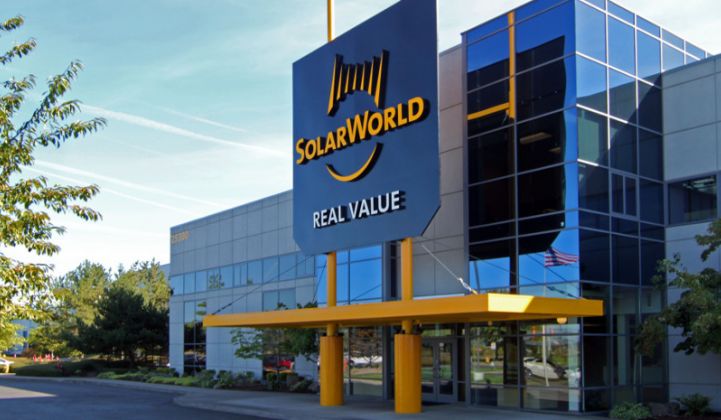Solar trade case petitioner SolarWorld Americas is the first company to announce that it will expand solar equipment manufacturing in the U.S. following a key trade case vote on Friday.
The Hillsboro, Ore.-based manufacturer issued a news release Monday stating that it would immediately begin ramping up production and hiring up to 200 workers by May 2018 "with the prospect of meaningful import relief close at hand."
The announcement comes after the U.S. International Trade Commission (ITC) voted 4-0 that foreign imports of crystalline-silicon cells and modules have caused "serious injury" to the domestic solar panel industry. The vote moves the Section 201 case brought by SolarWorld Americas and co-petitioner Suniva to a remedy phase. The ITC will hold a hearing on possible trade remedies on October 3 in Washington, D.C.
"Our struggle has always been about keeping alive the pioneering U.S. solar-technology industry as well as its workforce, from Ph.D. scientists to line workers,” said Juergen Stein, CEO and president of SolarWorld Americas, in a statement. “With relief from surging imports in sight, we believe we can rev up our manufacturing engine and increase our economic impact.”
Of all companies, the announcement from SolarWorld Americas is likely the least surprising to industry watchers. While some foreign solar panel makers have been weighing plans to enter the U.S. market, the financial risks associated with building a large-scale production facility are significant. There are valid reasons for companies to stand up manufacturing facilities in the U.S., but doing so purely in response to Section 201 remedies would be tricky if not impossible for timing reasons, as GTM Research analysts Shayle Kann and MJ Shiao have pointed out.
SolarWorld Americas already has a U.S. manufacturing plant in operation, although the company's workforce has dwindled from about 800 to 300 employees in recent months due to its financial struggles. In May, SolarWorld's parent company, SolarWorld AG, filed for insolvency in Germany. The U.S. arm has long argued that foreign imports, rather than bad business practices, are the source of the company's problems.
SolarWorld previously brought two anti-dumping trade petitions to the ITC and prevailed in both cases, and in at least two appeals. In October 2014, SolarWorld Americas announced an expansion of its Oregon solar module factory after the U.S. imposed tariffs on solar products from China and Taiwan. At the time, the expansion brought the company's total number of full-time employees to 900.
History suggests that the anti-dumping and countervailing duties were not effective at shoring up U.S. solar manufacturing, however, in light of the new Section 201 petition. Separately, research on previous Section 201 trade cases indicates that the benefits to the domestic industry in safeguard cases are short-lived. It's unclear if additional trade remedies under the current solar trade case will reboot U.S. solar cell and module manufacturing over the long term.
Meanwhile, the Solar Energy Industries Association estimates new trade remedies would put 88,000 American jobs in solar installation, sales and construction at risk.
With today's announcement, SolarWorld expects to employ a total of 500 American workers, some of them returning employees, by the end of the ramping period. In July, the company raised $6 million to fight the Section 201 trade case and shore up the business.
The cash infusion will reassure both customers and suppliers "that we will remain a reliable force not only in supplying leading solar technology but also in continuing to fight for fair trade in the U.S. market and improving market conditions there," Stein said at the time.
According to ITC figures, nearly 30 U.S. solar-panel producers ceased manufacturing operations from 2012 to 2016, the period of investigation in the Section 201 case. During this period, global imports to the U.S. increased nearly fivefold -- with China playing the leading role.
“Friday’s determination made clear that the U.S. industry’s problems have not been self-inflicted, but rather are the result of surging imports,” Stein said. “As such, we at SolarWorld are prepared to scale up our world-class manufacturing operations to produce leading solar products made by more American workers.”
While some of SolarWorld's partners will be heartened to hear that it's scaling up again, others in the industry will continue to have a tainted view of the company. Some solar installers and financial players have committed to avoiding use of the SolarWorld products because of the havoc and uncertainty the Section 201 case has wrought on the industry. But now that some kind of import relief seems likely, SolarWorld opponents may begin shift their position in order to procure tariff-free products.
The ITC's remedy phase gets underway with a prehearing conference scheduled for September 28, followed by the full hearing on October 3. The ITC will weigh stakeholder input and issue recommendations to the president by November 13. President Trump then will have 60 days to adopt that recommendation or suggest another remedy. The severity of possible trade remedies varies widely.



